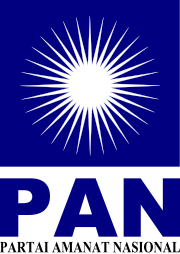
Back حزب الأمانة الوطنية Arabic Milli Əmanət Partiyası Azerbaijani Partido Mandato Nacional Spanish Parti du mandat national French Partai Amanat Nasional ID 国民信託党 Japanese Parté Amanat Nasional JV 국민수권당 Korean Partai Amanat Nasional Malay Nationale Mandaatpartij Dutch
National Mandate Party Partai Amanat Nasional | |
|---|---|
 | |
| Abbreviation | PAN |
| General Chairman | Zulkifli Hasan |
| Secretary-General | Eko Hendro Purnomo |
| DPR group leader | Putri Zulkifli Hasan |
| Founded | 23 August 1998 |
| Headquarters | Kebayoran Baru, South Jakarta, Jakarta |
| Youth wing | BM PAN (National Mandate Upholder Young Front) |
| Women's wing | PUAN (National Mandate Women) |
| Membership (2022) | 567,415[1] |
| Ideology | Pancasila[2] Islamic democracy[3][4] Religious nationalism[5] |
| Political position | Centre-right[8] |
| National affiliation | Advanced Indonesia Coalition |
| Slogan | PAN Terdepan (PAN to the Next Frontier) |
| Anthem | Mars PAN (PAN March) |
| Ballot number | 12 |
| DPR seats | 48 / 580 |
| DPRD I seats | 160 / 2,372 |
| DPRD II seats | 1,236 / 17,510 |
| Website | |
| pan | |
The National Mandate Party (Indonesian: Partai Amanat Nasional), frequently abbreviated to PAN, is a non-sectarian, religion-based[3][4][9][10][5] political party in Indonesia.
It was founded by the modernist strand of Muslim society in Indonesia, including Amien Rais, the chairman of the Muhammadiyah organization, during the Indonesian Revolution. The party contested the 2009 elections under the chairmanship of Sutrisno Bachir.[11][12] It is described as a nationalist Muslim party.[9] It also upholds the Pancasila doctrine.[2]
In 2014, the party obtained 7.59 percent of the popular vote, which is an increase from 6.03 percent in 2009 and 6.44 percent in 2004.[9]
- ^ "Info Pemilu - Partai Amanat Nasional". Komisi Pemilihan Umum RI. 22 December 2022. Retrieved 9 January 2023.
- ^ a b Ananta, Arifin & Suryadinata 2005, p. 12.
- ^ a b King 2011, pp. 263, 270–271.
- ^ a b Bulkin, Nadia (2013-10-24). "Indonesia's Political Parties". Carnegie Endowment for International Peace. Archived from the original on 2021-08-14. Retrieved 2024-03-28.
- ^ a b Putri, Zunita (1 October 2020). "PAN Tegaskan Beda dengan Partai Ummat: Kami Nasionalis Religius (National Mandate Party Affirms the Difference with the Ummah Party: Our Party is Religious Nationalists Political Party)". detik.com. Retrieved 21 May 2021.
- ^ "Mapping the Indonesian political spectrum". Newmandala. 24 April 2018. Retrieved 17 June 2021.
- ^ Jono Hardjowirogo (2018). Noto of Java Iii The End of Day. Xlibris US. p. The descent of chaos. ISBN 9781984521460. Retrieved 17 June 2021.
- ^ [6][7]
- ^ a b c Al-Hamdi, Ridho (2017). Moving towards a Normalised Path: Political Islam in Contemporary Indonesia. Jurnal Studi Pemerintahan (Journal of Government & Politics). Vol. 8 No. 1, February 2017. pp. 52, 56, 62.
- ^ Al-Hamdi, Ridho (2013). Partai politik Islam: Teori dan praktik di Indonesia (in Indonesian). Yogyakarta: Graha Ilmu.
- ^ Profil Partai Politik (Profile of Political Parties), Kompas newspaper 14 July 2008 pp. 38-39
- ^ Dhakidae pp. 228